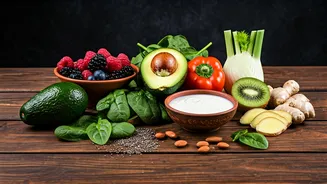Understanding Bloating Triggers
Bloating, a common digestive woe, often stems from excess gas production or disturbances in the movement of food through your digestive system. Several
dietary components can trigger this. Certain foods are notorious for producing gas, including those rich in fermentable carbohydrates and complex sugars, such as beans, broccoli, and carbonated beverages. Additionally, factors like swallowing air while eating, consuming high-sodium foods, and underlying medical conditions can contribute to bloating. Understanding the specific foods and habits that trigger bloating for you is the first step toward finding relief. This knowledge enables the customization of dietary strategies, allowing for more precise management and alleviation of symptoms, improving your digestive health and overall comfort.
Bananas for Relief
Bananas, often lauded for their potassium content, provide more than just electrolyte balance. They are also rich in soluble fiber, which can help regulate bowel movements and prevent constipation, a common cause of bloating. The fiber in bananas absorbs water in the gut, which can assist in easing gas and bloating. Additionally, bananas contain fructooligosaccharides (FOS), a type of prebiotic fiber that feeds beneficial gut bacteria. However, it's crucial to consume bananas in moderation, as excessive intake might cause gas in some people. Integrating bananas into your diet, whether sliced in cereal or as a quick snack, offers a simple and natural way to support digestive health and mitigate bloating, enhancing your comfort and digestive function.
Ginger's Anti-Bloating Power
Ginger, used for centuries in traditional medicine, is celebrated for its ability to soothe digestive troubles and ease bloating. Ginger contains gingerol and shogaol, compounds that help the digestive system function smoothly by accelerating stomach emptying. This quicker processing of food reduces the chances of gas buildup and bloating. Ginger also has anti-inflammatory properties that can calm the gut and reduce irritation, easing bloating. You can incorporate ginger in multiple forms: sipping ginger tea, adding fresh ginger to your cooking, or taking ginger supplements. Including ginger in your diet can significantly alleviate bloating and improve digestive comfort, allowing you to enjoy meals without discomfort, promoting overall digestive wellness.
Peppermint's Soothing Effect
Peppermint, often consumed as a tea, is well-known for its ability to relax the muscles of the digestive tract, therefore easing bloating and gas. The active ingredient in peppermint is menthol, which has antispasmodic properties that reduce the spasms that contribute to bloating. By relaxing the smooth muscles of the intestines, peppermint helps release trapped gas and facilitates the smooth passage of food. Consuming peppermint tea, or using peppermint oil in aromatherapy, are easy methods of utilizing its benefits. Those who struggle with bloating can find quick relief from peppermint by reducing abdominal discomfort and improving digestive function. This makes peppermint a naturally effective remedy for digestive issues.
Fennel Seeds for Digestion
Fennel seeds, often used in cooking and as a digestive aid, contain compounds that aid digestion and reduce bloating. These seeds contain anethole, which has anti-inflammatory and antispasmodic properties that relax the intestinal muscles. Fennel seeds also help reduce the occurrence of gas by easing spasms and improving the movement of food through the gut. Consuming fennel seeds after a meal can aid digestion, lessen bloating, and eliminate the associated discomfort. They can be chewed directly, incorporated into meals, or steeped in hot water as a tea. Using fennel seeds can improve your digestion, thus contributing to better gut health and a comfortable, less bloated abdomen.
Pineapple's Digestive Enzymes
Pineapple, a tropical fruit, contains bromelain, an enzyme that aids in breaking down proteins and reduces inflammation in the gut. By assisting in the digestion of proteins, bromelain reduces the likelihood of undigested food in the gut, thereby reducing gas production and bloating. Bromelain can also soothe the gut lining, minimizing irritation and inflammation that contributes to bloating. Consuming fresh pineapple or taking bromelain supplements can enhance digestion and lower bloating. Pineapple's natural enzymes work to keep digestive issues at bay, promoting the gut health and making digestion more comfortable. Thus, it becomes a valuable addition to a bloating-conscious diet, promoting comfort and digestive wellness.
Cucumber's Hydrating Benefit
Cucumbers are a fantastic choice for their high water content, aiding digestion and reducing bloating. Staying hydrated is vital for optimal digestive function; proper hydration assists in breaking down food and the smooth movement of waste through the intestines. Cucumbers also contain cucurbitacin, which has anti-inflammatory properties that calm the digestive system. By consuming cucumbers, you can help decrease water retention and bloating. Include cucumbers in salads, smoothies, or as a light snack to naturally support your digestive health and stay hydrated. This makes cucumbers a good option for improving digestion and diminishing the discomfort of bloating, offering a simple way to achieve better gut health and overall well-being.
Turmeric's Anti-Inflammatory Action
Turmeric, with its active compound curcumin, is celebrated for its powerful anti-inflammatory properties, making it an excellent ally in the fight against bloating. Curcumin helps calm the digestive tract by reducing inflammation in the gut, which can lessen bloating and gas. Additionally, turmeric can improve the digestive system's functionality. Incorporating turmeric into your diet—through curries, smoothies, or supplements—can offer digestive comfort and reduce bloating. Turmeric can significantly enhance your gut health and alleviate bloating issues, adding a natural and effective approach to digestive wellness. Thus, it serves as a valuable component of a healthy eating regimen, promoting overall wellness.
Probiotics for Gut Health
Probiotics, the beneficial bacteria that inhabit your gut, are crucial for a healthy digestive system, combating bloating by balancing gut bacteria. Probiotics improve digestion and reduce gas production by encouraging a balance of good and bad bacteria. Probiotic-rich foods like yogurt, kefir, and fermented vegetables introduce beneficial bacteria, supporting digestive processes. Regular intake of probiotics can significantly reduce bloating by supporting a healthy gut microbiome and improving digestive functions. By incorporating probiotics into your diet, you can support your gut health, alleviate bloating, and improve your overall digestive comfort. This will promote a balanced gut environment, which is essential for overall health and well-being.
Foods to Avoid for Relief
Besides adding beneficial foods, understanding which foods to avoid is equally important for managing bloating. Certain foods are known to trigger gas and bloating, including those high in fermentable carbohydrates (FODMAPs), carbonated beverages, and artificial sweeteners. Limit or avoid beans, broccoli, cabbage, onions, and processed foods that often contain high sodium content. Understanding these trigger foods allows for a more personalized approach to diet management, reducing bloating. Keeping a food diary and tracking symptoms can help you pinpoint your personal trigger foods. Removing these foods from your diet will contribute to a more comfortable, less bloated state, helping you better manage your digestive health and enhance your general well-being.















